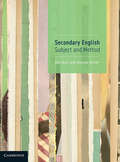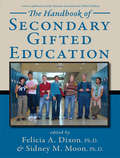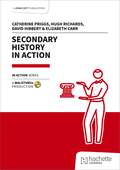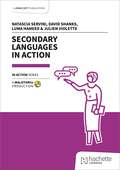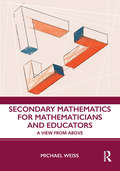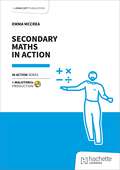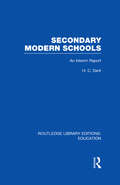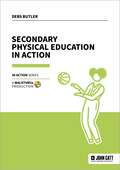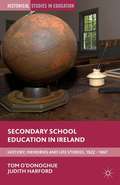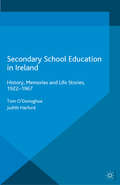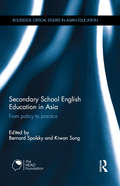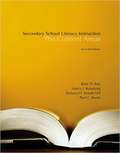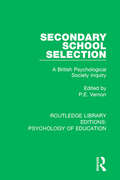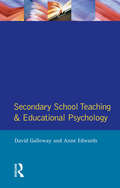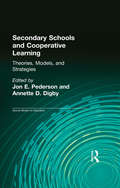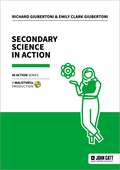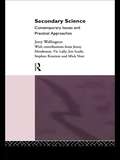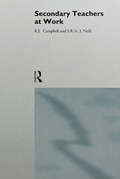- Table View
- List View
Secondary English: Subject and Method
by Rod Quin Duncan DriverSecondary English: Subject and Method is a comprehensive introduction to the theory and practice of teaching English in secondary schools for pre-service teachers. Written by highly accomplished teachers of subject English, the book's practical approach to language, literacy and literature, fosters the skills of assessment, unit planning and teaching strategies. With detailed consideration of reading, writing, grammar and language conventions, and chapters devoted to a variety of text types, Secondary English scaffolds you on the journey from learner to a teacher of English. To support this journey Secondary English uses a range of engaging features, including: Learning outcomes aligned to the Australian Professional Standards for Teachers; The voice of teacher and student experiences; Pause and think questions; Theory to practice boxes; Lesson plans and classroom activities; End-of-chapter activities help build pre-service teachers' resource files. Secondary English is a useful resource for introducing pre-service teachers to the practice of teaching English.
Secondary Gifted Education
by Sidney M. Moon Felicia A DixonThis ground-breaking textbook is designed to help education professionals interested in building effective and comprehensive educational opportunities for gifted secondary students. This book offers an in-depth, research-based look at ways schools and classrooms can support the development of gifted adolescents. The Handbook of Secondary Gifted Education is the most comprehensive critical resource on this topic available. Each chapter of this educational resource is written by leading scholars and researchers in the field, including education leaders such as Nicholas Colangelo, Susan Assouline, Sally Reis, Donna Ford, Joyce VanTassel-Baska, Carolyn Callahan, and many more.
Secondary History in Action
by Elizabeth Carr Catherine Priggs Hugh Richards David HibbertDrawing on over 60 years' combined experience of history teaching and history curriculum leadership, Carr, Hibbert, Priggs and Richards explore ways to make history memorable, engage students in historical thinking and secure excellent outcomes for all. Their perspective is grounded in history's disciplinary distinctiveness and a vision for its purpose in students' education. The authors of Secondary History in Action articulate practical approaches to history curriculum design, ways to teach disciplinary history in the classroom and methods to assess students' knowledge and understanding. They draw together recent research and established traditions in history teaching discourse in a coherent summary that will be helpful to trainee and beginning teachers, non-specialist teachers of history, subject leaders and senior leaders line-managing history departments.
Secondary History in Action
by Elizabeth Carr Catherine Priggs Hugh Richards David HibbertDrawing on over 60 years' combined experience of history teaching and history curriculum leadership, Carr, Hibbert, Priggs and Richards explore ways to make history memorable, engage students in historical thinking and secure excellent outcomes for all. Their perspective is grounded in history's disciplinary distinctiveness and a vision for its purpose in students' education. The authors of Secondary History in Action articulate practical approaches to history curriculum design, ways to teach disciplinary history in the classroom and methods to assess students' knowledge and understanding. They draw together recent research and established traditions in history teaching discourse in a coherent summary that will be helpful to trainee and beginning teachers, non-specialist teachers of history, subject leaders and senior leaders line-managing history departments.
Secondary Languages in Action
by David Shanks Natascia Servini Luma Hameed Julien VioletteWith more than 50 years of current teaching experience between them, the authors of Secondary Languages in Action have created an accessible summary of research and thinking on approaches to MFL teaching, cutting through the noise of online debates and keeping the focus on application in the classroom.Each chapter guides you through different elements of MFL teaching, covering all the skills but also tips on how to increase engagement, make the case for languages and enrich the curriculum, with clear examples of a range of activities and projects. The book considers how the strategies can be adapted and applied to any classroom, whatever your level of experience or teaching context.Whether you're beginning your journey into teaching training, working as a language assistant, or are an experienced teacher looking for new inspiration and ideas, this is an essential guide for all MFL classroom-based staff.
Secondary Languages in Action
by David Shanks Natascia Servini Luma Hameed Julien VioletteWith more than 50 years of current teaching experience between them, the authors of Secondary Languages in Action have created an accessible summary of research and thinking on approaches to MFL teaching, cutting through the noise of online debates and keeping the focus on application in the classroom.Each chapter guides you through different elements of MFL teaching, covering all the skills but also tips on how to increase engagement, make the case for languages and enrich the curriculum, with clear examples of a range of activities and projects. The book considers how the strategies can be adapted and applied to any classroom, whatever your level of experience or teaching context.Whether you're beginning your journey into teaching training, working as a language assistant, or are an experienced teacher looking for new inspiration and ideas, this is an essential guide for all MFL classroom-based staff.
Secondary Mathematics for Mathematicians and Educators: A View from Above
by Michael WeissIn this engaging text, Michael Weiss offers an advanced view of the secondary mathematics curriculum through the prism of theory, analysis, and history, aiming to take an intellectually and mathematically mature perspective on the content normally taught in high school mathematics courses. Rather than a secondary mathematics textbook, Weiss presents here a textbook about the secondary mathematics curriculum, written for mathematics educators and mathematicians and presenting a long-overdue modern-day integration of the disparate topics and methods of secondary mathematics into a coherent mathematical theory. Areas covered include: Polynomials and polynomial functions; Geometry, graphs, and symmetry; Abstract algebra, linear algebra, and solving equations; Exponential and logarithmic functions; Complex numbers; The historical development of the secondary mathematics curriculum. Written using precise definitions and proofs throughout on a foundation of advanced content knowledge, Weiss offers a compelling and timely investigation into the secondary mathematics curriculum, relevant for preservice secondary teachers as well as graduate students and scholars in both mathematics and mathematics education.
Secondary Maths in Action
by Emma McCreaIn Secondary Maths in Action, experienced curriculum expert and maths teacher Emma McCrea offers insights into the complex task of teaching maths.Taking an evidence-informed stance, Emma first explores the age-old question of why we study maths and the important role it plays in our lives and in society. Next she examines several pertinent debates in maths - those of pupil grouping, mastery and gender. Finally, we are taken on a grand tour of curriculum, pedagogy and assessment as the fundamental pillars of great teaching.Additionally, the book includes four rich case studies, revisited throughout the curriculum, pedagogy, and assessment chapters, which help to showcase how these ideas can be applied in various contexts - so you can really see what it all looks like In Action.
Secondary Maths in Action
by Emma McCreaIn Secondary Maths in Action, experienced curriculum expert and maths teacher Emma McCrea offers insights into the complex task of teaching maths.Taking an evidence-informed stance, Emma first explores the age-old question of why we study maths and the important role it plays in our lives and in society. Next she examines several pertinent debates in maths - those of pupil grouping, mastery and gender. Finally, we are taken on a grand tour of curriculum, pedagogy and assessment as the fundamental pillars of great teaching.Additionally, the book includes four rich case studies, revisited throughout the curriculum, pedagogy, and assessment chapters, which help to showcase how these ideas can be applied in various contexts - so you can really see what it all looks like In Action.
Secondary Modern Schools: An Interim Report (Routledge Library Editions: Education)
by H C DentThis book examines what progress the Secondary Modern Schools had made in the mid 1950s, based on first hand observation and conversations with teachers, parents, school governors and education officers. As well as looking at their achievements, the author highlights the challenges that the Secondary Modern Schools had to deal with during the years surveyed.
Secondary Physical Education in Action
by Debs ButlerAs an experienced teacher and sports coach, Debs Butler explores research and thinking on approaches within secondary Physical Education teaching while maintaining a focus on application to motivate and inspire a love for sports. With a vision of what experiencing PE should be for a student, this book covers a breadth of topics including planning a PE curriculum, theory PE, feedback, dialogue and modelling.Butler highlights the importance and value of PE, along with a range of ways to promote engagement and uptake and so, whether you are beginning your journey into teacher training, working as a teaching assistant or are an experienced teacher looking for new inspiration and ideas, this is an essential guide for all PE classroom-based staff.
Secondary Physical Education in Action
by Debs ButlerAs an experienced teacher and sports coach, Debs Butler explores research and thinking on approaches within secondary Physical Education teaching while maintaining a focus on application to motivate and inspire a love for sports. With a vision of what experiencing PE should be for a student, this book covers a breadth of topics including planning a PE curriculum, theory PE, feedback, dialogue and modelling.Butler highlights the importance and value of PE, along with a range of ways to promote engagement and uptake and so, whether you are beginning your journey into teacher training, working as a teaching assistant or are an experienced teacher looking for new inspiration and ideas, this is an essential guide for all PE classroom-based staff.
Secondary School Education in Ireland: History, Memories and Life Stories, 1922 - 1967 (Historical Studies In Education)
by Tom O'Donoghue Judith HarfordAdopting a life story approach, this book explores the memories of those who attended Irish secondary schools prior to 1967. It serves to initiate and enhance the practice of remembering secondary school education amongst those who attended secondary schools not just in Ireland, but around the world.
Secondary School Education in Ireland: History, Memories and Life Stories, 1922 - 1967 (Historical Studies in Education)
by Tom O'Donoghue Judith HarfordAdopting a life story approach, this book explores the memories of those who attended Irish secondary schools prior to 1967. It serves to initiate and enhance the practice of remembering secondary school education amongst those who attended secondary schools not just in Ireland, but around the world.
Secondary School English Education in Asia: From policy to practice (Routledge Critical Studies in Asian Education)
by Bernard Spolsky Kiwan SungContinuing on from the previously published Primary School English-Language Education in Asia: From Policy to Practice (Moon & Spolsky, 2012), this book compiles the proceedings which took place at the 2011 annual conference of AsiaTEFL which took place in Seoul, Korea. It surveys the current status, practices, challenges, and future directions of Secondary English education in 11 diverse countries - in Israel, Japan, Korea, Singapore, Bangladesh, India, Indonesia, Malaysia, Pakistan, Vietnam and China. Given the importance of secondary English education as the central feature for continuing development of target language and culture in English language teaching in Asia, each contributed chapter includes key policies, theories, and practices related to the development and implementation of country-specific curricular and instructional programs in secondary English educational contexts in these countries. Secondary School English Education in Asia: From Policy to Practice critically analyses both sides of the English language debate – from advantages to complications – in its chapters including: Educating for the 21st Century: The Singapore Experience Miles to Go …: Secondary Level English Language Education in India English Language Education Innovation for the Vietnamese Secondary School: The Project 2020 Exploring the Value of ELT as a Secondary School Subject in China: A Multi-goal Model for English Curriculum Secondary School English Education in Asia will appeal to English Language Teaching (ELT) researchers, teacher educators, trainee teachers and teachers, primarily those teaching in Asia.
Secondary School Literacy Instruction
by Paul Burns Betty Roe Barbara Stoodt-Hill Nancy KolodziejWell known for its detailed and practical explanations of reading, writing, and study strategies, SECONDARY SCHOOL LITERACY INSTRUCTION is required reading for all non-literacy teaching majors. Its motivational pedagogy especially appeals to pre-service teachers, who quickly realize that the text will help them improve their students' progress. Two hallmark chapters on content area teaching have brought this text wide acclaim for its unique application of literacy and study skills in all secondary subject areas. The text also is recognized for its proven pedagogy, including ""Meeting the Challenge,"" which puts ideas into classroom practice, and ""Focus on English Language Learners"" and ""Focus on Struggling Readers,"" which highlight important applications for these special needs learners in easy-to-locate sections in each chapter.
Secondary School Selection: A British Psychological Society Inquiry (Routledge Library Editions: Psychology of Education)
by P. E. VernonSelection for secondary education at 11-plus still arouses widespread controversy; and the psychological techniques which are employed, such as intelligence and attainments tests, are often criticised. Originally published in 1957, under the auspices of the British Psychological Society, a group of psychologists, experienced in this field, tried to present a balanced survey of the situation at the time. They show that the real problems of secondary schooling cannot be solved by simple administrative changes; they arise from historical causes, from the class structure of English society and the educational and vocational ambitions of parents. Psychology has studied the development and differentiation of children’s abilities and interests with age, and thus throws light on the need for, and the consequences of, streaming children in different classes or schools, and the value of alternative systems such as the comprehensive school. Selection at 11-plus, it is admitted, does have harmful effects on teaching in the junior school and produces much emotional strain, though these effects are often exaggerated. It was, in fact, accurate for some ninety per cent of children; yet the implications of its inevitable inaccuracy for some pupils cannot be ignored. The functions, and the value, of intelligence and attainments tests and the essay are examined, and full consideration given to the use of teachers’ estimates of suitability and other techniques. The Report is addressed primarily to teachers, educational administrator, and psychologists – that is people with some background knowledge of the problems involved; but it should also be intelligible and helpful to the educated layman, since the more technical details are confined to Appendices.
Secondary School Teaching and Educational Psychology (Effective Teacher, The)
by Anne Edwards David GallowayA companion volume to Primary School Teaching and Educational Psychology, this book concerns itself with the day-to-day business of teaching in a secondary school. Throughout the book four themes reoccur: that teachers can best understand the development of children by observing their learning and their relationships within school; that assessment and evaluation are integral to effective teaching; that effective teaching and learning depend on both teacher and child being able to monitor own progress and to find solutions to problems that occur; and finally that there must be explicit recognition of the common-ground between educational psychology and other disciplines such as sociology, philosophy and the history of education.
Secondary Schools and Cooperative Learning: Theories, Models, and Strategies (Source Books on Education #40)
by Jon E. Pedersen Annette D. DigbyOriginal essays by noted scholars explore cooperative learning, curriculum development, and teaching strategies. Focusing on grades 9 through 12, the volume first emphasizes theories underlying the use of selected cooperative learning strategies in secondary schools and then examines strategies and practical applications for classrooms. Contributors include David Johnson, Roger Johnson, Ruven Lazarowitz, Yael Sharan, Shlomo Sharan, Robert Slavin, Karl Smith, and others who have successfully implemented cooperative learning strategies in science, math, social studies, English/language arts, and gifted and talented. These contributors focus on how models are utilized and implemented. Discussions involve obstacles that impede success, problems and concerns, solutions, and suggestions for problem solving. An index is provided.
Secondary Science 11 to 16: A Practical Guide
by Gren Ireson Mark Crowley Ruth L. Richards John TwidleAre you looking for teaching ideas to make your science lessons come alive? Full of suggestions for exciting practical work to engage children, this book addresses and explains the science behind the experiments, and emphasises the need to engage the learner through minds-on activities. It shows you where to make links to the national curricula in England, Scotland, Wales and Northern Ireland, and it covers the three sciences: chemistry, biology and physics. The detailed subject knowledge helps you grasp key concepts, and there are lots of useful diagrams to illustrate important points. Experiments include: - extracting DNA from a kiwi fruit - capturing rainbows - the chromatography of sweets - removing iron from cornflakes - a plate tectonic jigsaw These practical activities will provide you with ways to ensure your students respond enthusiastically to science, and the book will also help you develop your subject knowledge and ensure you meet your Qualified Teacher Status (QTS) standards. Perfect reading for Secondary Science PGCE students, as well as those on the Graduate Teacher Programme (GTP), this book is also ideal for non-specialists who are looking for support as they get to grips with the sciences. Gren Ireson is Professor of Science Education at Nottingham Trent University. Mark Crowley is a Teaching Research Fellow in the Centre for Effective Learning in Science, Nottingham Trent University. Ruth Richards is Subject Strand Leader for the PGCE and Subject Knowledge Enhancement (SKE) courses in Science at Nottingham Trent University, and an examiner for A-level Geology. John Twidle is Subject Leader for the PGCE and MSc Science programmes at Loughborough University.
Secondary Science in Action
by Emily Clark Giubertoni Richard GiubertoniThere is nothing more exciting in science teaching than transforming students into effective, enthusiastic biologists, chemists and physicists. To this end, this book spells out the skills and strategies of the successful science teacher in action.Drawing on years of teaching experience, Richard and Emily Giubertoni set out top tips for effective practice in all areas of a science teacher's role, from curriculum planning to managing practicals, from powerful hinterland stories to how to approach controversial topics.The useful approaches set out in this book will have value for science teachers at all stages of their careers, from trainee teachers to department leaders.Being an effective teacher is not innate: we can all learn to teach, to teach well, and to teach better. In this thoroughly comprehensive overview of science teaching in action, all science teachers will find ideas to strengthen, inspire and further develop their teaching practice, in a practical and pragmatic book that is enjoyable and engaging to read.
Secondary Science in Action
by Emily Clark Giubertoni Richard GiubertoniThere is nothing more exciting in science teaching than transforming students into effective, enthusiastic biologists, chemists and physicists. To this end, this book spells out the skills and strategies of the successful science teacher in action.Drawing on years of teaching experience, Richard and Emily Giubertoni set out top tips for effective practice in all areas of a science teacher's role, from curriculum planning to managing practicals, from powerful hinterland stories to how to approach controversial topics.The useful approaches set out in this book will have value for science teachers at all stages of their careers, from trainee teachers to department leaders.Being an effective teacher is not innate: we can all learn to teach, to teach well, and to teach better. In this thoroughly comprehensive overview of science teaching in action, all science teachers will find ideas to strengthen, inspire and further develop their teaching practice, in a practical and pragmatic book that is enjoyable and engaging to read.
Secondary Science: Contemporary Issues and Practical Approaches
by Jerry WellingtonScience education has changed radically in recent years, both as a result of debates within the subject and because of curriculum legislation. Jerry Wellington discusses the major issues in science education today - such questions as the balance of content and process in the curriculum, the role of practical work and the nature of science as a subject - and uses this discussion to support a very practical resource for teachers in training and their mentors. The book covers every aspect of science teaching, including: Planning Differentiation and special needs Assessment Practical work Problem solving and investigations IT in science Handling sensitive issues, e.g. sex education Building on children's prior learning Throughout, Wellington's guidance is accompanied by suggestions for discussion, activities for individual and group use and annotated lists of further reaing aimed at helping the reader to build up a personal approach to the teaching of the subject. Students will also be helped by the glossaries of specialist terminology at the end of each chapter and by the references to National Curriculum attainment targets at every point in the book.
Secondary Stem Educational Reform
by Carla C. JohnsonFederal and state funding agencies have invested billions of dollars into secondary STEM (Science, Technology, Education, Mathematics) educational reform over the past decade. This volume addresses the interplay of external and internal variables associated with school reform and how this dynamic has impacted many efforts.
Secondary Teachers at Work (The Teaching as Work Project)
by Jim Campbell S. R. NeillThe first part of this book charts and analyses 2,688 working days of 384 teachers in 91 LEAs in 1991. It shows how they spent their working lives, how well matched their teaching was to their academic background, and the balance between teaching and other aspects of their work. The analysis uses five major categories: Teaching, Preparation, Administration, Professional Development and Other Activities. The authors argue that there is an occupational split between `the managers' and `the teachers'. The second part comments on the findings by relating them to issues of school management, and teacher professionalism, arguing that `conscientiousness' poses a professional dilemma for secondary teachers.
